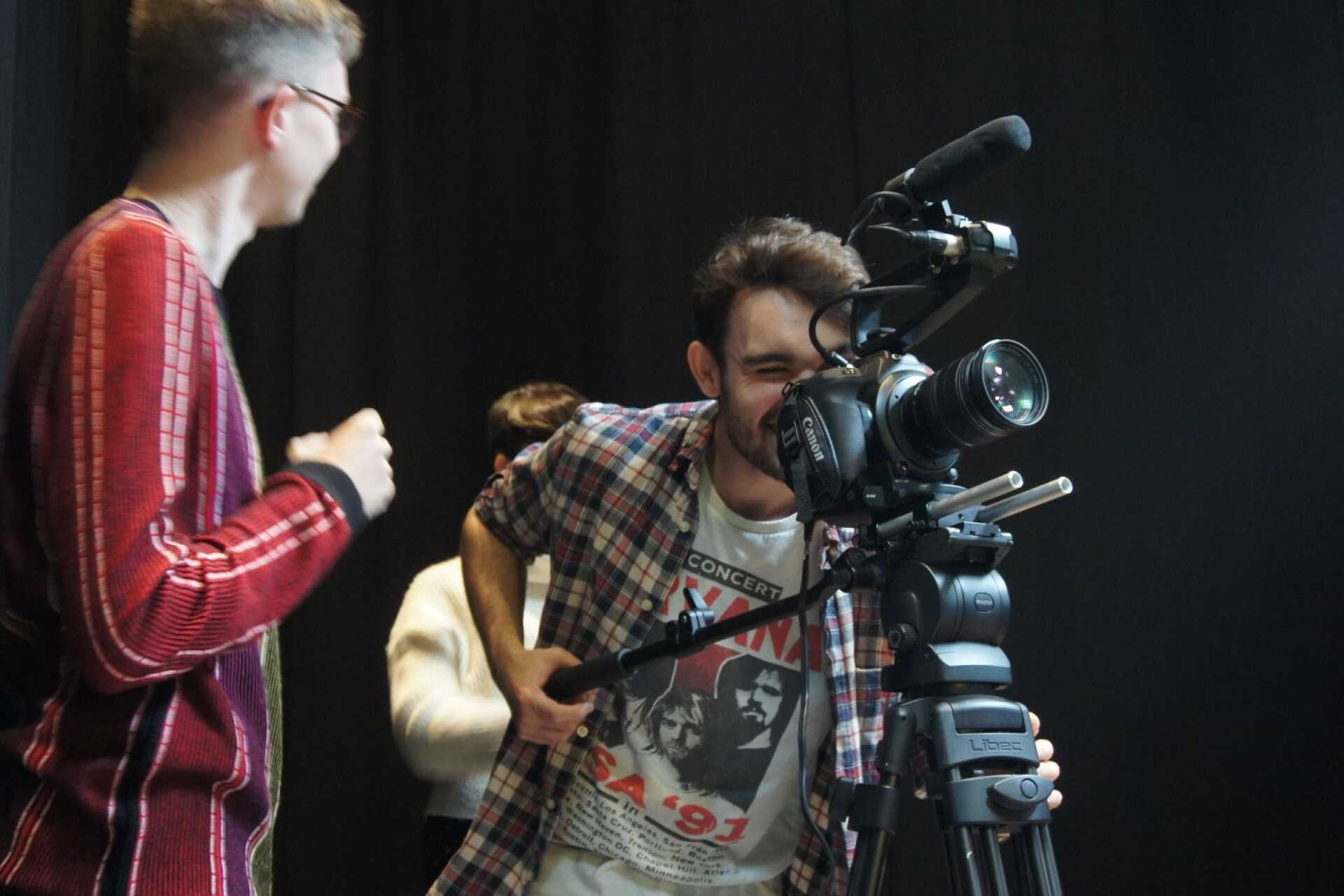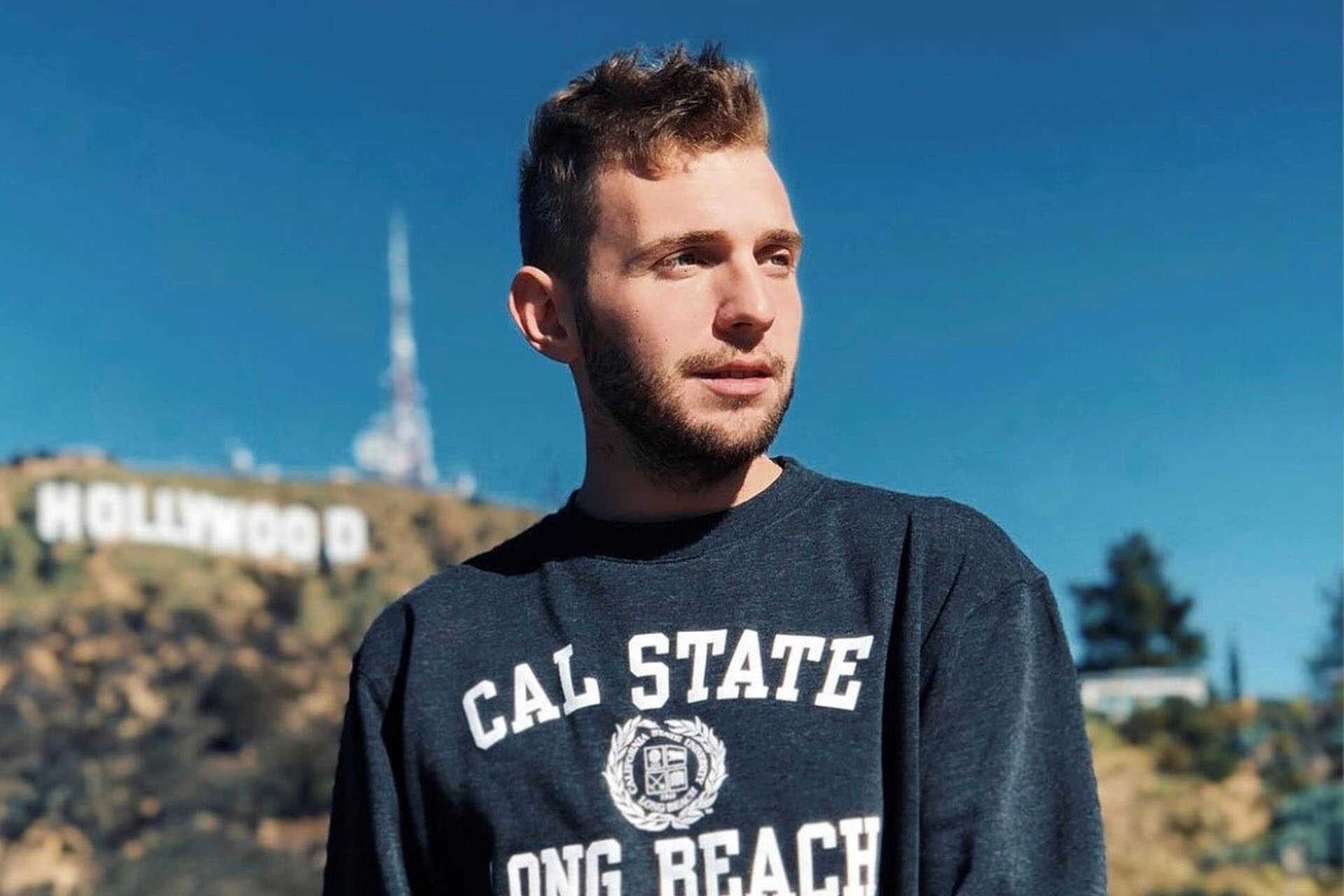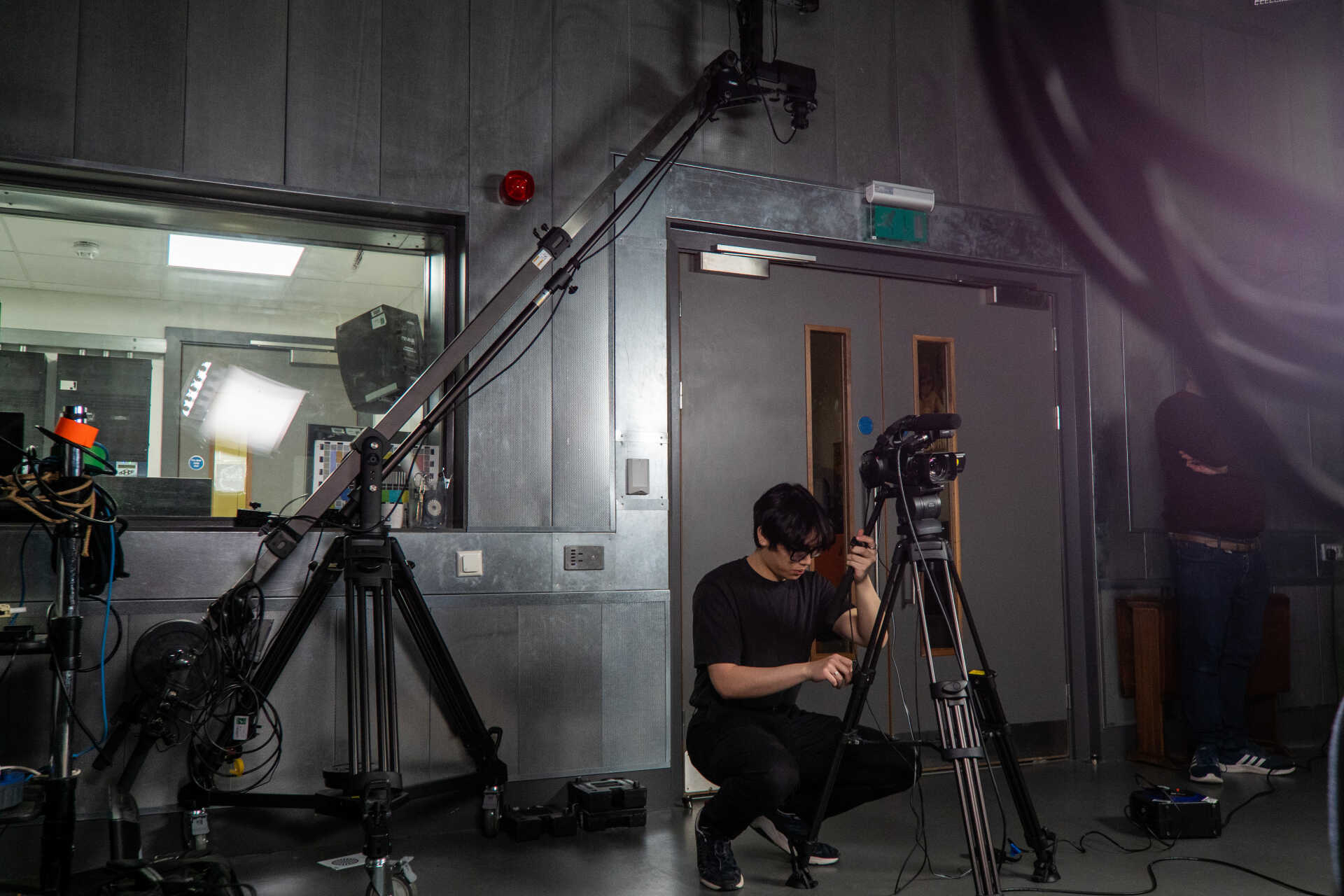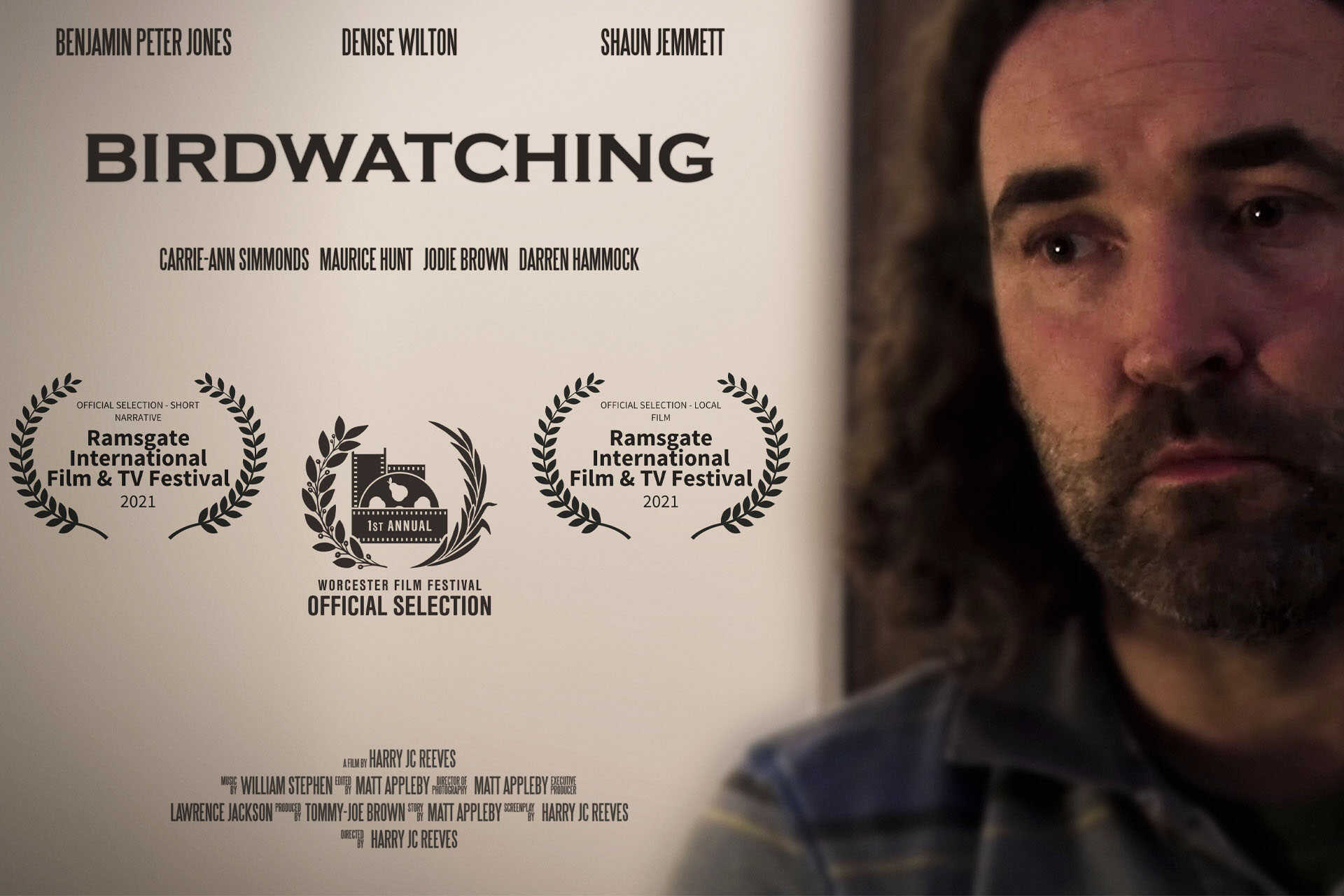Film
with a Year Abroad
Find your vision as a filmmaker and critic. Explore the history of film and create its future.

Find your vision as a filmmaker and critic. Explore the history of film and create its future.
Think you've found the right course? We still have spots available through Clearing. Apply now to secure your place and join our dynamic and welcoming community at Kent this September.
Apply nowExplore film from its silent beginnings through to CGI blockbusters, taking in avant-garde and international cinemas on your way, and find your own voice as a critic and a filmmaker.
Kent has been at the forefront of developing film as an academic subject for over 30 years and we continue to innovate in our teaching and practice. You'll be taught by practitioners and researchers whose work contributes to contemporary debate. Their expertise means that you have a wide choice of areas to discover.
Your year abroad takes place between your second and final year of study. In previous years, students have studied at our partner institutions in Asia, Europe and North America.

From Hollywood to horror, location scouting and screenwriting to film sound, you can follow your passions. Theory or Practice? You can do both!
We're ranked 8th in The Guardian University Guide 2024.

Recent Film graduate Massimiliano Folgheraiter describes how his experiences at Kent helped him to secure a place on a film production course in LA.
We have excellent links to film bodies, such as the British Film Institute, Arts Council England and the Independent Cinema Office and Kent Film.

Our production spaces include chroma-key green screen and black serge cycloramas, an extensive lighting grid and edit suites.
Our typical offer levels are listed below and include indicative contextual offers. If you hold alternative qualifications just get in touch and we'll be glad to discuss these with you.
At Kent, you’re more than your grades. We look at each student’s circumstances as a whole before deciding whether to make an offer to study here. We also take this flexible approach when we receive your exam results. Some courses may prefer your qualifications to include specific subjects, which will be listed below if required.
Check our Clearing vacancy list or call us now +44 (0)1227 768896 to find out if we have a course that’s right for you. See our Clearing website for more details on how Clearing works at Kent.
The following modules are offered to our current students. This listing is based on the current curriculum and may change year to year in response to new curriculum developments and innovation:
The course introduces students to the language of film, from aspects of mise-en-scène (setting, performance, costumes, props, lighting, frame composition) to framing (camera movement, shot scale, lenses), sound (fidelity, volume, timbre) and editing (from requirements for spatial orientation through matches on action, eyeline matches and shot-reverse-shot structures to temporal manipulations through ellipsis and montage). The study of these elements enables students to understand the spatial and temporal construction of films, as well as the stylistic, expressive and/or dramatic functions of specific strategies.
This module approaches the "big questions" that have surrounded film and the moving image and puts them into historical context. Although specific topics will vary, representative topics may address competing definitions of film and its constitutive elements, the effects that cinema has on spectators, the social, cultural and political implications that moving images reproduce, and the status of the medium between art and entertainment. Students will debate seminal writings on the nature of film and bring their arguments to bear on exemplary film productions.
This course examines film history and historiography through a series of case studies. In carrying out this investigation students will be invited to work with secondary and primary sources held in the library and will be encouraged to evaluate the aesthetic, technological, economic, social and political histories presented in this module. Students will understand the role and value of the contextual study of film and will be given the opportunity to research and write on selected aspects of film historiography. The choice of case studies will depend upon the expertise of the module convenor and is not restricted to a particular national cinema or period; case studies may include, for instance, the history of film by means of the study of a particular theme and cultural context in the history of film.
Introduction to Filmmaking draws upon concepts in Film Studies to inform an introduction to moving image production that focuses on the exploration of cinematic language. Basic technical skills in DV production and post-production are taught along with craft skills applicable to both narrative and experimental screen production. Through a combination of lectures, screenings, creative and technical workshops, and peer reviews of work in progress, this module encourages experimentation, critical reflection, independent thought, and dialogue between theory and practice. Effective group work is integral to the success of student work on this module. Practical work is designed to trigger both conceptual and creative thinking as well as consideration of audience responses to cinematic language. The essay, a critical analysis of the finished film, is designed to encourage a dialogue between theory and practice.
You have the opportunity to select elective modules in this stage.
The art historian Aby Warburg – an avid reader of Thomas Carlyle's philosophical novel about clothes Sartor Resartus (1836) – said that a good costume, like a good symbol, should conceal as much as it reveals. This module will take an interdisciplinary approach to the study of costume and fashion – the art that can be worn – in order to explore their roles in drama, film and the visual arts. The social values encoded by clothes, their relation to class or sexual identity, will be discussed, along with how these assumptions inform the use of costume in adaptations or stagings of texts, or how they colour our view of a character, or of a director’s interpretation (for example, using deliberate anachronism). The role of clothing and costume in the history of art will be analysed from artists’ representation of clothes, contemporary or otherwise, to their involvement in fashion design.
This module will look at disability in the arts, covering theatre, film and visual art. The students will engage with the historical representation of disability within the arts and the way in which disability scholars have critically engaged with it. The students will also look at arts institutions (i.e. theatres, cinemas and galleries) and the disabling barriers within those institutions that prevent the full participation of people with impairments in the arts. This will culminate in an 'accessibility review', whereby the students analyse the adjustments made by arts institutions for people with impairments and the extent to which they are effective. Finally, the students will engage with examples of contemporary disabled artists whose impairments informs the aesthetic qualities of their work.
This is a practice-based module exploring the photographic medium and the contexts of its use through the production of photographs in response to a project brief and group-based critical discussion of the work produced. Students investigate how the context in which photographs are made affect how the world is represented, and how in turn these images shape perception. Students choose two practical project briefs that are designed to enable them to explore the medium creatively and through informed and reflective practice. The emphasis of the module is upon this creative practice rather than the acquisition of specific technical skills, and as such students are at liberty to use any photographic production and post-production technologies they wish to experiment with or find appropriate. A camera phone and access to a computer and printer are all that is needed for this module, though students who wish to make use of digital image processing or analogue processes, including use of a darkroom, are encouraged to do so. Each of the practical project briefs will be supported through a series of lectures closely examining various genres, styles and other contexts of photographic production through the work of those who have shaped them. In addition students will present the work they have produced in response to their project briefs, and engage in a broad critical discussion or their own and other's work.
For much of film history and in most of the world, Hollywood productions have dominated the market share of film consumption. Nevertheless, film production is a worldwide phenomenon and these 'world' or 'national' cinemas have significant cultural, social and economic functions both within domestic contexts and abroad. This module investigates cinema from one world country or region. The case study will vary from year to year: for example, Latin America; Scandinavia; Eastern Europe; China, Korea and/or Japan. In introducing films from the case-study nation or region, the module aims to study how filmmakers actively franchise, adopt and rework film styles and genres; respond to the (film) culture and history of the domestic country and also to 'Hollywood' and international cultures; and/or tailor their practice to tastes of local and foreign audiences and gatekeepers. Above and beyond, the module will investigate the funding structures, distribution strategies and/or other industrial structures and norms that incentivise certain topics and representation styles. We will critically assess transnational aspects of the 'national' cinema in question, in the context of international multi-media corporate conglomerates' involvement in creative industries.
This module studies individual genres, which may vary across different academic terms (it may focus on the horror, science-fiction, western, musical, comedy, the noir or the gangster film, among others). It combines aesthetic and narrative analysis with the history of the genre. The theoretical framework draws from traditionally employed methods to study the genre in question (for example, psychoanalytical, postmodern or cognitive theory). The historical portion of the course examines the genre's growing commercial viability, the proliferation of subgenres, and the growing attention of academics. Topics include, but are not restricted to, gender politics, representations of sexuality, political commentary, allegory.
Cinema has typically been conceived of as an essentially visual phenomenon – films, it is often said, are essentially moving pictures. Sound has, nevertheless, played an important role from the beginnings of cinema, a fact which has been acknowledged in the detailed historical, theoretical and critical work on film music, and film sound more generally. Sound, Music and Cinema will provide an overview of this field of research, and aim to provide students with a clearer understanding of and greater sensitivity to the soundtrack. The course will begin by setting up an introductory framework for the understanding of sound, which considers the relationship between music and other aspects of film sound (speech, ambient sound, sound effects), as well as the nature of the relationship between sound and image. Subsequent sessions will consider the evolution of sound technology and its impact on the aural aesthetics of film; the use of classical and popular music in film scores; the emergence of sound designers, in contemporary cinema; and the distinctive and innovative use of sound and music by a number of 'sound stylists'.
This module offers students an introduction to the terms, ideas and craft, involved in the creation of screenplays. Screenwriting is a unique form of writing with very different concerns from the novel, theatre and radio. Although the screenplay is a vital component of a film's success, it tends to be neglected as a separate art form.
In this module we explore the conventions of dramatic structure, new narrative forms and short film variations. Students are encouraged to think critically about screenplay writing and will have an opportunity to write their own screenplay. A selection of writing exercises have been designed to take them through the writing process; from preparation and initial concept to final draft.
The emphasis here will be on practical knowledge and support as students uncover their creative voice. This module does not aim to provide vocational training for students wishing to pursue careers in the feature film or television industries.
Through technical exercises and presentation of film texts, students will engage with key aspects of non-fiction filmmaking. A series of practical projects will be contextualised through lectures drawing on a number of film texts, looking at examples from the history of the non-fiction film e.g. early cinema, direct cinema, cinema verité, and the film essay. The exercises are an opportunity for students to develop their creative practice. The development of a treatment / proposal leading to the production of final film project will use theory and critical analysis to develop students understanding of documentary practice.
Students will build on existing skills of collaboration (learnt on FILM3080/90 Introduction to Filmmaking), improving competence in the planning, production and editing of practical, creative work. Students will develop an understanding of crucial aspects of non-fiction filmmaking -- in terms of both theory and practice -- and deepen their skills in the critical analysis of such texts. Students will build on existing skills of relating theory and practice, by analysing the implications (e.g. ideological, ethical) of their production decisions; the course will enhance student's ability to reflect self-critically on their own and other student's practical work.
The key themes of this module are contextualising the work of students by gaining a historical overview of genre filmmaking, and guiding students towards making a short film within the parameters of a chosen genre(s). From seminars and a series of instruction sessions in camera, sound and editing, students will develop, shoot and edit in groups an original short fiction film idea in a genre chosen from or combining, but not exclusive to, the following: crime, musical, horror, melodrama, western, science fiction, road movie, romantic comedy. This idea will be brought to fruition in a series of seminars designed to develop students' creative potential, alongside screenings of relevant genre films. Secondly, students will be asked to write an essay in which they analyse a feature film in a chosen genre and relate it to their own project idea.
The module studies the emergence and consolidation of the studio system in Hollywood, between the coming of sound in 1929 until the collapse of the studios in 1960. Indicative topics include the rise of the star system; the emergence of genres; self-regulation and censorship; developments in technology; and changes in audience. Examination will be made of the development of the 'classic Hollywood cinema' style of film against the backdrop of varying contexts of production, distribution, exhibition and regulation. A focus on genres (such as the gangster film, western and musical) in their various phases of development and permutation will be a lens for student understanding of the importance of standardization. Studio development and collapse are also seen in broader historical and political contexts, enabling students to appreciate the forces that motivated film production, distribution and exhibition during the period.
The module looks at various philosophical problems as presented in films. This will involve discussing a range of different philosophical topics, from different areas of philosophy. Film here is presented as a way into the philosophical discussion, which will be supplemented by appropriate primary and secondary texts. The course will then consider ways in which the medium of film itself presents philosophical problems.
Topics to be covered will vary from year to year, in light of the expertise of the person convening it and student feedback from previous years. At least some of the module will be devoted to philosophical issues concerning film will itself, such as whether film itself is or can be a form of philosophy.
Students will gain a good understanding of several topics in philosophy. They will also critically explore whether the medium in which philosophy is conducted is potentially a constraint on or a complement to the aims of the philosophy. The module will enable students to evaluate issues, both timely and timeless, in a manner that's informed by an interdisciplinary approach to philosophy.
You have the opportunity to select elective modules in this stage.
Going abroad as part of your degree is an amazing experience and a chance to develop personally, academically and professionally. You experience a different culture, gain a new academic perspective, establish international contacts and enhance your employability.
Students on a four-year degree programme spend a year between Stages 2 and 3 at one of our partner universities in Europe (Amsterdam, Berlin, Bologna, Lausanne and Paris); the USA (California and Indiana); or Asia (Hong Kong). For a full list, please see Go Abroad. Places are subject to availability, language and degree programme.
You are expected to adhere to any academic progression requirements in Stages 1 and 2 to proceed to the year abroad including achieving a merit in Stage 1 and 2. If the requirement is not met, you are transferred to the equivalent three-year programme. The year abroad is assessed on a pass/fail basis and will not count towards your final degree classification.
Spending a period as full-time student at an overseas university, students will follow teaching and tuition in their own subject areas as well as choosing from a range of available courses in the Humanities. The curriculum will vary according to the partner institutions. Additionally, students will usually be offered to take language classes and/or courses on the culture of the host country.
This interdisciplinary course will examine historical and current theoretical ideas and research on the ways in which art is created and perceived. Artforms that will be considered include visual arts (painting, sculpture, architecture, popular art), performing arts (dance and theater), music, and film. Readings will interface with subdisciplines of psychology such as perception, psychoaesthetics, neurophysiology, social psychology, and studies of emotion. Principal areas of focus will include aesthetics, arts-experimental design, perception of art, meaning in art, the psychology of the creative process, social and cultural issues, and the ramifications of arts-sciences research. The primary focus will be on Western art forms, though other world art traditions and aesthetics will also be discussed. Assessment methods will test understanding through a summary and critical reflection on a selected text and the proposal, research, and design and oral presentation of a potential interdisciplinary research project.
A significant number of films and television programmes are adapted from other sources, and adaptation frequently arouses powerful responses from viewers and critics. This course explores this phenomenon, providing the close study of screen adaptations taken from a variety of other media which may include theatre, classic novels, short stories and comics. This course will provide an overview of adaptation studies, by addressing the particular questions that relate to adaptation, considering the connections and differences between distinct media, focusing on key features such as the manipulation of time and space, characterisation, point of view, style, voice, interpretation and evaluation. Students will be encouraged to consider adaptation within an industrial context and the creative and practical implications of adapting works for the screen. Within the remit of the course, there will be opportunities for students to develop their own creative interests within adaptation studies in conjunction with a deeper understanding of the key theoretical concepts underpinning the discipline.
This course introduces students to the history and theory of film criticism, emphasising the coexistence of different approaches to the analysis, evaluation and appreciation of film. The module will also have a practical aspect, offering students the opportunity to write critical pieces on the films screened for the class. In addition to traditional lectures and seminars, some sessions will be devoted to writing and to analysing fellow students' work. Participants will also be encouraged to reflect critically on different media of film criticism (newspapers, magazines, academic journals, the internet, television) and on the current state of film criticism.
Although both secondary schools and universities are institutions devoted to the distribution of knowledge, universities distinguish themselves crucially: uniquely, they are also sites dedicated to the production of original knowledge. In this module students will engage with cutting-edge research in one topic of film studies. The specific topic of the module varies from year to year according to the expertise of the convenor. (For the year's specific topic, please get in touch with the module convenor.)
Students will engage with key aspects of microbudget filmmaking through technical exercises and the presentation of their own films. A series of practical projects will be contextualised through lectures drawing on a number of films, looking at examples from the history of the extremely low budget genres such as horror, crime, independent and experimental films. The exercises are an opportunity for students to develop their creative practice. The development of a screenplay for the final film project will use theory and critical analysis to develop students' understanding of microbudget filmmaking practice.
Throughout its history, film has functioned as a powerful sociopolitical engine. Individuals and groups have used this medium to express their identities (whether gender, sexual, ethnic, class, political, national, taste or intersectional constellations thereof) to various audiences, to portray their histories and current realities, to interrogate social norms, to agitate for civil rights and to imagine more equal futures. By the same token, film's unique capacities to reflect, refract and represent has also meant that individuals and groups have also used the medium to exert power or subjugate, create and reinforce stereotypes about the Other or justify their own dominance in the social order. This module focusses on this vital aspect of cinema. Each year the convenor will focus on one case study or series of case studies, for example: how the portrayal of violent women protagonists in action film and television series challenge notions of femininity; the interrelation between gender representation and genre more widely; the use of film as tool for politically/ideologically motivated State-run cinemas (e.g. USSR, Nazi Germany); cinema’s role in the identity wars of post-Vietnam 1970s America; the History of African American cinema; the construction and interrogation of sexuality and queer identities.
This module introduces students to the academic analysis of screen space as well as to the professional careers and practical applications of film and television space in the industry, including location scouting, shooting and production design. Screen Space and Location Scouting investigates films and/or television series shot on location and the staging of real spaces in studio. With a focus on cityscapes and rural landscapes, the module looks both at topographically accurate uses of specific spaces and at creative geographies where cities, towns and streets are made to 'play' the role of other places. This module also introduces students to mapping spatial film data (e.g., using software such as geographic information system, QGIS). Assessments include both an academic analysis of film space as well as a practice-based component focussing on real-world processes of location scouting.
Content producers - especially actors and directors – are the most publicly visible representatives of the film industry. However, these individuals stand in for only a tiny fraction of the jobs, roles and institutions that ultimately shape films and frame their horizons of expectations for audiences: e.g. funding bodies, festivals, critics, exhibitors and regulators. This module delves into one such vital value-adding institution, film marketing and distribution, regarding it as much more than a neutral 'pipeline' for delivering films and making audiences aware of them. Using a range of case studies that will vary from year to year, the module illuminates, for example, how marketing is used to mitigate risk and maximise revenue; the various purposes, forms and formats of film publicity; how distributors purchase rights and assemble lists; how distributors and marketers position individual films to certain target audiences and territories; how film audiences select which films to view; how cinematic exhibition fits within multi-platform distribution strategies; and the rise of ‘non-traditional’ distribution portals (e.g. Netflix and Amazon).
In mainstream media franchises, contemporary moving images are now typically transmedial, existing in different forms and across different platforms: for example, the Marvel universe includes comic books, films (released in cinemas and VoD) and games. This multiplicity of platforms generates new, and takes further existing, forms of fan culture as media-makers use transmedial platforms to reach new audiences and create media that can be experienced across multiple devices. The module explores fan culture and its engagement with different media content, and offers a critical and creative perspective on how media exist across different formats.
Factual entertainment (or 'fact ent'), one of the most widely consumed formats of television, film, podcast and other media, delivers non-fiction or unscripted scenarios in accessible, popular forms. This module critically analyses the format and provides students with an opportunity to plan and produce an exemplary creative work. Each week’s topic will focus either on an aspect of production or in-depth discussion of a specific sub-genre of factual entertainment, which may include true-crime podcasts, reality TV, talent shows, lifestyle series or science and nature documentaries. The module furthermore aims to enhance students’ ability to critically reflect on debates over ethics, objectivity, the media maker’s role and/or audience manipulation. Through exercises and presentation of ideas, students will engage with key practical considerations of making factual entertainment, which may include proposal-writing and pitching, using found/archival footage, collaborating with production companies, and analysing the implications (e.g. political, ethical) of their production decisions.
This module examines the concepts of stardom and celebrity. Often used as synonyms, the two terms in fact relate to different types of media constructs. The module will consider the history of the rise of stardom within the Hollywood context, exploring how the establishment of 'the star' became an integral part of the industry. Students will examine the ‘star system’ and its relationship to a range of topics which may include: performance; genre; the representation of gender and gendered bodies; audiences and fan studies; stars within dominant cultures and subcultural groups; and acting as labour. The topic will be illuminated through the analysis of key theoretical texts – many of which laid the foundations for star studies within film, media and cultural studies – as well as via opportunities for students to explore primary sources, such as movie magazines. The module also traces how the stardom industry described above became a component within a larger network of celebrity culture. Often characterised as a more contemporary phenomenon, the notion of ‘celebrity’ incorporates prominent figures in the public eye to whom the extension of fame is not necessarily based on any specific skill, talent or achievement. The module explores this context in conjunction with the apparent decline of the dominance of Hollywood stars, as a variety of mediated identities are promoted, consumed and commodified within diverse media landscapes. Using scholarship from within the interdisciplinary field of celebrity studies, students analyse how celebrities can take on many forms including actors, TV personalities and influencers, using different media platforms such as film, television, online streaming and social media. The importance of media technologies within both the study of stars and celebrity culture is stressed throughout the course.
You have the opportunity to select elective modules in this stage.
All modules involve lectures, small group seminars and film screenings (where relevant). On average, you have two lectures and three hours of seminars each week, plus four to six hours film viewing.
Depending on the modules you select, assessment varies from 100% coursework (extended essays or dissertation), to a combination of examination and coursework.
For a student studying full time, each academic year of the programme will comprise 1200 learning hours which include both direct contact hours and private study hours. The precise breakdown of hours will be subject dependent and will vary according to modules.
Methods of assessment will vary according to subject specialism and individual modules.
Please refer to the individual module details under Course Structure.
The programme aims to:
You gain knowledge and understanding of:
You gain the following intellectual abilities:
You gain subject-specific skills in the following:
You gain transferable skills in the following:
Kent School of Arts has an excellent reputation and many links to professional practices. This network is a great way to help get your foot in the door in the industry, and means the community you join at Kent stays with you beyond your time here. Recent graduates have gone on to work in:
You'll also develop key transferable skills including: the ability to work independently or as part of a team; to analyse and problem solve; to communicate your ideas and opinions.

The 2024/25 annual tuition fees for this course are:
For details of when and how to pay fees and charges, please see our Student Finance Guide.
For students continuing on this programme, fees will increase year on year by no more than RPI + 3% in each academic year of study except where regulated.*
The University will assess your fee status as part of the application process. If you are uncertain about your fee status you may wish to seek advice from UKCISA before applying.
Fees for undergraduate students are £1,850.
Fees for undergraduate students are £1,385.
Students studying abroad for less than one academic year will pay full fees according to their fee status.
The following course-related costs are not included in your tuition fees.
For students taking film practice/production modules, we recommend you purchase:
Our video production facilities will be Adobe-based. Therefore, if you wish to invest in your own equipment, these purchases will ensure it fits in seamlessly with our technology. However, any student unable to make these purchases will be guaranteed the use of the same, or better, University resources and will not be disadvantaged.
For students taking the Beyond Cinema module:
You have the opportunity to attend special screenings. Participation is strongly encouraged. The fee for these activities is due in the first few weeks of term and is approx. £20 (based on previous years).
Find out more about accommodation and living costs, plus general additional costs that you may pay when studying at Kent.
Kent offers generous financial support schemes to assist eligible undergraduate students during their studies. See our funding page for more details.

We have a range of subject-specific awards and scholarships for academic, sporting and musical achievement.
Student Life

In the QS World University Rankings 2024, Kent has been ranked 39th within the UK and is in the top 25% of Higher Education Institutions worldwide.
Kent Sport
Kent has risen 11 places in THE’s REF 2021 ranking, confirming us as a leading research university.

An unmissable part of your student experience.